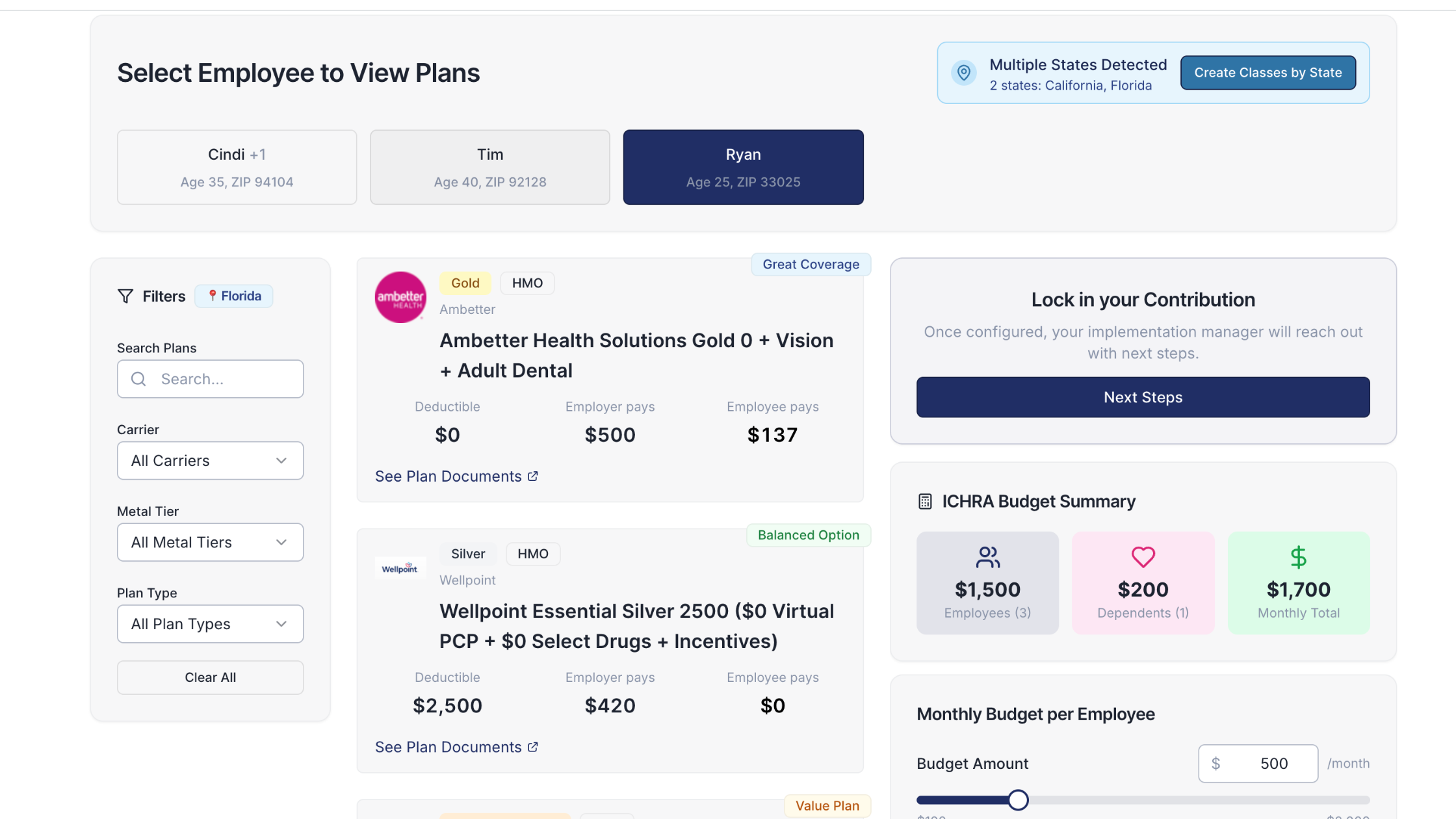Can an ICHRA reimburse medicare premiums?

TLDR: Yes. ICHRA can be used to reimburse Medicare Part A, B, C, D, and Medigap policies.
The Intersection of ICHRA and Medicare
Employees aged 65 and above are some of the biggest "winners" of ICHRA. ICHRA allows employees in this age group to pay for a comprehensive health insurance coverage package. It also allows them to access a comprehensive war chest of pre-tax Health Wallet dollars that can be used for out-of-pocket medical expenses. Most employees in this age group that Venteur supports are able to fund their entire year of medical expenses and still have money left over.
How Does Medicare Work?
Medicare is a federal health insurance program primarily targeting individuals aged 65 or older. It also covers certain individuals with end-stage renal disease or qualifying disabilities. Today, approximately 66 million people are covered by Medicare.
Medicare coverage consists of multiple parts
Medicare Part A
Provides coverage for inpatient hospital stays, skilled nursing facility care, hospice care, and some home health care services.
Medicare Part B
Covers medically necessary services, including doctor visits, outpatient care, preventive services, and durable medical equipment.
Together, Medicare Part A and B ensure comprehensive coverage for eligible individuals, giving them peace of mind when it comes to their healthcare needs. Employees over 65 participating in ICHRA are required to have Medicare A and B to receive reimbursement funds.
Medicare Part C
Also known as Medicare Advantage, Part C is an alternative to Original Medicare. These plans are offered by private insurance companies approved by Medicare and provide all the benefits of Parts A and B, along with additional coverage such as prescription drugs, dental, vision, and hearing services.
Medicare Part D
Part D is the prescription drug coverage offered by private insurance companies that work alongside Original Medicare. This can be particularly advantageous for those who rely on multiple medications or expensive specialty drugs.
Supplemental insurance, also known as Medigap
These policies helps cover the gaps in Medicare coverage, such as deductibles, copayments, and coinsurance. Medigap policies are typically offered by private insurance companies. Individuals typically have Medicare Advantage OR a Medigap plan -- but not both.
OK, but remind me what an ICHRA is?
Here's a quick refresher on what is an ICHRA. In a nutshell, ICHRA is a modern and flexible approach to healthcare coverage has gained traction in recent years.
What is an ICHRA?
An ICHRA, short for Individual Coverage Health Reimbursement Arrangement, is an employer-sponsored health insurance benefit in which employers provide pre-tax cash to their employees. Employees can use this cash to select and purchase an individual health insurance plan of their choice. Employees can also use funds for qualified medical expenses. It's like a choose-your-own-adventure for healthcare!
Imagine having the freedom to explore various health insurance options and select the one that best suits your needs. With an ICHRA, employees have the power to make informed decisions about their healthcare coverage. Whether it's a comprehensive plan that covers all medical expenses or a more cost-effective option with higher deductibles, the choice is in their hands.
Not only does this empower employees, but it also encourages them to take an active role in managing their healthcare. By allowing individuals to choose their coverage, ICHRA promotes a sense of ownership and responsibility when it comes to healthcare decisions.
Key Features of ICHRA
ICHRA has some unique features that set it apart from traditional employer-sponsored health insurance plans:
1. It's available to employees regardless of the size of their employer. This means that even small businesses can offer their employees the benefits of an ICHRA.
Traditionally, small businesses have struggled to provide comprehensive health insurance options due to the high costs involved. However, with ICHRA, employers can contribute any amount they want, offering a more personalized approach. T
2. ICHRA's flexibility allows businesses to tailor their healthcare benefits to the specific needs of their employees.
ICHRA offers employees the freedom to choose coverage that suits their individual needs. This means that individuals can select plans that align with their unique healthcare requirements, whether it's specialized coverage for chronic conditions or plans that include additional wellness benefits.
3. ICHRA comes with the added advantage of portability.
If an employee decides to leave their current job, they can take their ICHRA with them. This ensures continuity of coverage and eliminates the stress of having to find new insurance options during a transitional period.
How to use ICHRA to Reimburse Medicare Premiums
ICHRA can be used to reimburse Medicare Part A, B, C, D, and Medigap policies. Employees must have both Part A and Part B coverage to be eligible to claim ICHRA funding from their employer. This requirement ensures that individuals have comprehensive coverage that aligns with the goals of ICHRA.
By using ICHRA to reimburse these premiums, individuals can enhance their Medicare coverage and reduce out-of-pocket expenses. This can be especially beneficial for those who require frequent medical services or have chronic conditions that require ongoing care. ICHRA can create a comprehensive and cost-effective healthcare solution.
Eligibility and reimbursement options may vary depending on the specific ICHRA plan and the employer's chosen parameters. Employers should carefully review the terms and conditions of their ICHRA plan to ensure compliance with all legal requirements and to maximize the benefits available to their employees.
By understanding the legal framework and meeting the necessary conditions, employers can leverage ICHRA to provide comprehensive coverage options to their employees, including reimbursement for Medicare Advantage and Medigap premiums. The possibilities are vast, and with careful planning and adherence to the rules, employers can navigate the complexities of ICHRA and Medicare to create a robust and inclusive healthcare offering.
You got questions, we got answers!
We're here to help you make informed decisions on health insurance for you and your family. Check out our FAQs or contact us if you have any additional questions.
Explore more related content
What is Venteur
Explore the best human-first Health Insurance platform
Simple, personalized health benefits
Sign up in minutes, define your contribution, and let your employees choose the health plan that works right for them
Integrations to make everything run smoothly
We'll connect with your payroll and finance systems to make deductions and premium payments seamless
Easy onboarding and off-boarding
In just a few clicks, add your roster and make updates on the fly. We'll handle it from there.
Venteur Certified Brokers to help your employees pick the right plan
Our trusted brokers ensure the best outcomes for employees and employers by unlocking health savings and providing unrivaled plan options.
AI-powered plan recommendations to give you confidence while you shop
Backed by 30 years of healthcare data, Venteur’s AI helps employees compare and choose the best plan for their unique situation.
Compliance and reporting because no-duh!
Venteur manages plan administration, reporting, and compliance so you can focus on growing your business.


